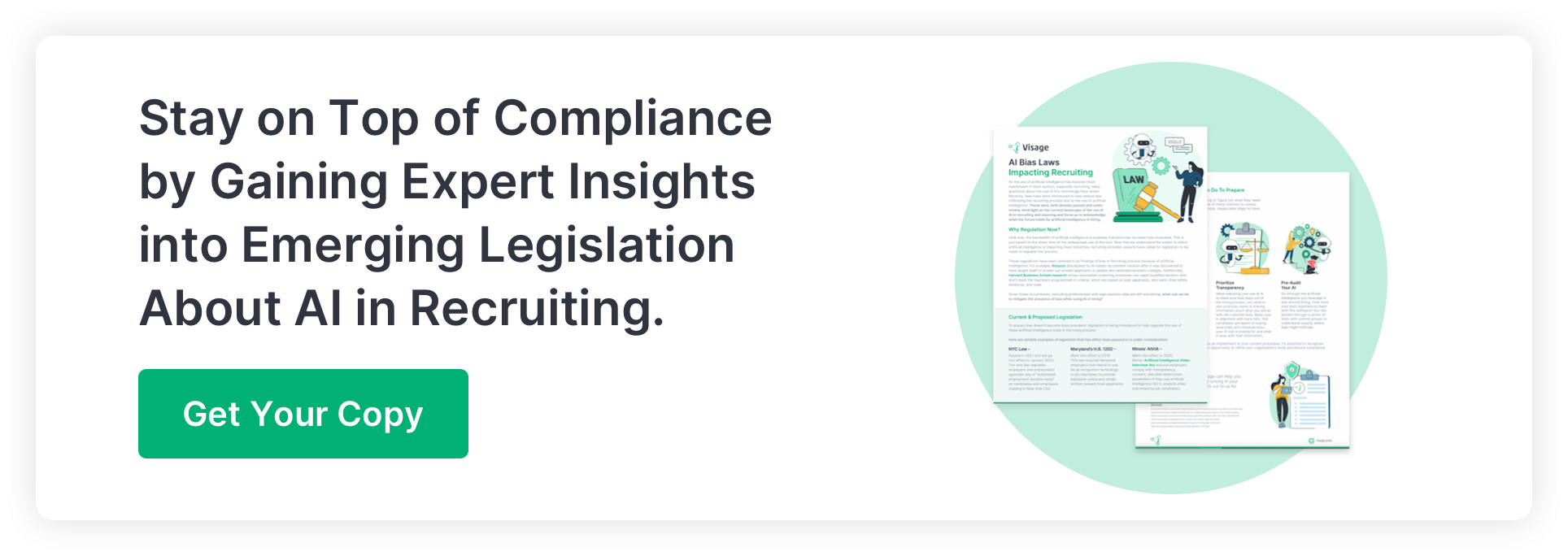Bias in recruiting has rightfully been top of mind for many, if not most, talent acquisition professionals. For people in recruiting, your process means everything, and you can’t afford to have bias infiltrating your approach to recruiting. Many strides have been made in recent years to help combat unconscious bias in recruiting, and they have helped recruiters progress to a more inclusive future.
It’s not hard to find detriments associated with bias in recruiting. We all know bias is a harmful, sometimes overlooked, element that all humans have. No person is immune from unconscious bias, but the steps we take to help remove it from the hiring process make the workforce stronger and more inclusive.
Find out if your #HiringProcess is being obstructed by biases and how to combat them in the latest blog Share on XCommon Biases in Recruiting
Often, bias in recruiting can seem like a distant, intangible concept. Of course, we understand what it means, but since it’s so overwhelmingly present in every person, it can feel too big to tackle. However, when we break down some of the most common biases found in recruiting, we can better understand how to keep an eye out for them and eventually reduce or eliminate them.
Take a look at some of the most frequently detected forms of bias in the recruitment process:
Confirmation bias: As its name implies, confirmation bias is when people tend to seek out information that confirms (get it?) their own beliefs or worldview. This could be seen in a situation where a hiring manager was choosing between two equally qualified candidates for an administrative role, but they have a preexisting bias toward thinking women are better in administrative roles.
Halo effect: The halo effect occurs when a positive trait from a person leads us to believe that most or all of their traits are positive as well. If a hiring manager saw that a potential candidate volunteers every week, they could make the assumption that this candidate is fully altruistic in every aspect of their life, leading to an inaccurate perception of this candidate.
Affinity bias: Affinity bias can also be referred to as “similarity bias.” Essentially, this bias means you like people who are similar to you. This bias is probably the most easily recognized and understood. If a hiring manager were to see their alma mater on a potential candidate’s resume, they could be swayed to think highly of them because of their shared similarity.
Bandwagon effect: Once again, the bandwagon effect is very aptly named. At its core, it means that you are jumping on the bandwagon and agreeing with opinions already made and agreed upon by several other people. A hiring manager could potentially be swayed in a decision by the bandwagon effect if their recruiting team all collectively decided their top candidate won’t be a good fit.
The Impacts of Bias in Recruiting Unchecked
Aside from the inherent damage that comes with unchecked bias in recruiting, some tangible proof points make a case for reducing as much bias in recruiting as possible.
First, unchecked bias in recruiting can lead your team to be less productive. At the most granular level, bias in recruiting results in less diverse teams, and less diverse teams are quantitatively proven to be less effective than their diverse counterparts. In fact, inclusive teams perform up to 30% better in high-diversity environments, according to Gartner.
Learn more about bias in recruiting and see if it is infiltrating your hiring process in the latest blog Share on XNext, bias in the hiring process ultimately can impact your business’s bottom line. McKinsey & Company found that companies are 33% more likely to experience above-average profitability when they have ethnically-diverse executive teams.
Finally, employee satisfaction can be at risk if you don’t fix the bias in your hiring process. A lack of diversity, either caused by bias in recruiting or simply bad hiring practices, can have a negative impact on employee morale and lead to higher turnover rates.
Reducing Bias In Recruiting
For many, the solution to bias in recruiting is easily found by using AI in the sourcing process. Unfortunately, even the most sophisticated AI software can be subject to exhibiting biases. Artificial intelligence is a pattern-recognition technology, and when created by humans, it can reflect unconscious biases previously thought to be eliminated. Because AI is constantly referencing data sets provided by humans, bias can easily slip in nearly undetected if it’s leveraged too soon in the process.
Because bias in recruiting can largely be attributed to unconscious biases held by people, it makes sense that people are turning to AI and automation to help mitigate the impact of these biases. Unfortunately, AI is not a save-all to prevent all biases from appearing. In fact, experts are suggesting it might be contributing to more issues.
In the wake of legislation passed like the AI bias law in NY, employers will have to be vigilant about the type of AI they use in their recruitment strategies. The new law regulates employers and employment agencies’ use of “automated employment decision tools” on candidates and employees residing in New York City and will penalize employers for violating the bill.
At Visage, we understand the importance of AI, automation, and human interaction, which is why we blend our tools with sourcing experts so that we can add a human touch to the recruitment process. Our sourcing process is done by humans (a diverse global community of 4,000 sourcers) and our sourcers undergo training to receive a certification in sourcing for diversity and inclusion. We designed our AI to only match our customer’s needs with the best sourcers based on their industry expertise and to verify that the profiles that our sourcers submit match the criteria specified by our customers. We do not rely on our AI to select any candidates. We leave that to the human experts.
Our team has over 4,000 certified and trained sourcers available 24/7. And our expert sources span every industry around the globe. When you combine this human intelligence with our AI-powered platform, you’ll have qualified, talented, and diverse candidates on your desk in hours.
It’s time you ease the burden on yourself and your recruiters. Take the first step by expanding your sourcing and engagement capabilities with our intelligent global platform.
To learn more about how Visage can help you to reduce the bias potentially lurking in your hiring process, reach out to us for a demo.


Director of Sourcing Operations at Visage, Evelyn has experience in agency, RPO, and in-house roles spanning 12 years in the recruitment industry. Evelyn has built and oversees a 4000-member global freelance sourcing community. Every Christmas in Ireland, she enjoys putting up her THREE Christmas trees.